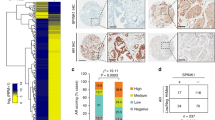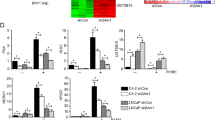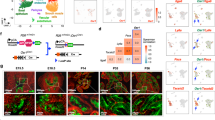Abstract
We previously characterized the LNCaP prostate cancer progression model and showed that despite loss of Bcl-2 protein in the androgen-unresponsive LNCaP-unresponsive (UR) cells, these cells maintained an increased resistance to the induction of apoptosis. Since the loss of Bcl-2 protein coincided with the progression to androgen-unresponsiveness, we sought to determine if Bcl-2 expression was regulated through androgen signaling pathways. LNCaP-responsive (R) and -UR cells grown in charcoal-stripped serum conditions for 3 months differentiated to a neuroendocrine (NE)-like morphology. Under these conditions, LNCaP-UR cells regained Bcl-2 protein expression, and LNCaP-R cells overexpressed Bcl-2. Chronic exposure to casodex resulted in differentiation of both LNCaP-R and -UR cells to the NE-type morphology accompanied by a marked downregulation of Bcl-2 protein, while Bax protein levels were unchanged. Downregulation of Bcl-2 was post-transcriptional since Bcl-2 message levels were unchanged in LNCaP cells treated with casodex. These data suggest that Bcl-2 is post-transcriptionally modulated by androgen signaling pathways in LNCaP cells.
This is a preview of subscription content, access via your institution
Access options
Subscribe to this journal
Receive 4 print issues and online access
$259.00 per year
only $64.75 per issue
Buy this article
- Purchase on Springer Link
- Instant access to full article PDF
Prices may be subject to local taxes which are calculated during checkout







Similar content being viewed by others
References
McDonnell TJ et al. Expression of the protooncogene bcl-2 in the prostate and its association with emergence of androgen-independent prostate cancer. Cancer Res 1992; 52: 6940–6944.
Matsushima H et al. bl-2 [corrected] Expression on prostate cancer and its relationship to cell cycle and prognosis. Int J Urol 1996; 3: 113–117.
Bubendorf L et al. Prognostic significance of Bcl-2 in clinically localized prostate cancer. Am J Pathol 1996; 148: 1557–1565.
Tang DG, Chopra DP, Porter AT . Extended survivability of prostate cancer cells in the absence of trophic factors: Increased cell proliferation, evasion of apoptosis and the role of apoptosis proteins. Cancer Res 1998; 58: 3466–3479.
Rothermund CA, Kondrikov D, Lin MF, Vishwanatha JK . Regulation of Bcl-2 during androgen-unresponsive progression of prostate cancer. Prostate Cancer Prostatic Dis 2002; 5: 236–245.
Buttyan R, Shabsigh A, Perlman H, Colombel M . Regulation of apoptosis in the prostate gland by androgenic steroids. Trends Endocrinol Metab 1999; 10: 47–54.
Bruckheimer EM et al. Regulation of Bcl-2 expression by dihydrotestosterone in hormone sensitive LNCaP-FGC prostate cancer cells. J Urol 2003; 169: 1553–1557.
Coffey RN et al. Androgen-mediated resistance to apoptosis. Prostate 2002; 53: 300–309.
Jindal HK, Vishwanatha JK . Functional identity of a primer recognition protein as phosphoglycerate kinase. J Biol Chem 1990; 265: 6540–6543.
Wu HC et al. Derivation of androgen-independent human LNCaP prostatic cancer cell sublines: role of bone stromal cells. Int J Cancer 1994; 57: 406–412.
Lin MF et al. Expression of human prostatic acid phosphatase correlates with androgen-stimulated cell proliferation in prostate cancer cell lines. J Biol Chem 1998; 273: 5939–5947.
Rhim JS et al. Stepwise immortalization and transformation of adult human prostate epithelial cells by a combination of HPV-18 and v-Ki-ras. Proc Natl Acad Sci USA 1994; 91: 11874–11878.
Cox ME, Deeble PD, Bissonette EA, Parsons SJ . Activated 3′,5′-cyclic AMP-dependent protein kinase is sufficient to induce neuroendocrine-like differentiation of the LNCaP prostate tumor cell line. J Biol Chem 2000; 275: 13812–13818.
Murillo H et al. Role of PI3K signaling in survival and progression of LNCaP prostate cancer cells to the androgen refractory state. Endocrinology 2001; 142: 4795–4805.
Deeble PD, Murphy DJ, Parsons SJ, Cox ME . Interleukin-6- and cyclic AMP-mediated signaling potentiates neuroendocrine differentiation of LNCaP prostate tumor cells. Mol Cell Biol 2001; 21: 8471–8482.
Zelivianski S et al. Multipathways for transdifferentiation of human prostate cancer cells into neuroendocrine-like phenotype. Biochim Biophys Acta 2001; 1539: 28–43.
Abrahamsson PA . Neuroendocrine differentiation in prostatic carcinoma. Prostate 1999; 39: 135–148.
Donnini M et al. Apoptosis is associated with modifications of bcl-2 mRNA AU-binding proteins. Biochem Biophys Res Commun 2001; 287: 1063–1069.
Berney CR et al. Evidence for post-transcriptional down-regulation of the apoptosis-related gene bcl-2 in human colorectal cancer. J Pathol 2000; 191: 15–20.
Chen Y, Kayano T, Takagi M . Dysregulated expression of bcl-2 and bax in oral carcinomas: evidence of post-transcriptional control. J Oral Pathol Med 2000; 29: 63–69.
Pratesi G, Perego P, Zunino F . Role of Bcl-2 and its post-transcriptional modification in response to antitumor therapy. Biochem Pharmacol 2001; 61: 381–386.
Bollito E et al. Relationship between neuroendocrine features and prognostic parameters in human prostate adenocarcinoma. Ann Oncol 2001; 12 (Suppl 2): S159–S164.
Acknowledgements
This work was supported by grants from the Pfeiffer (Gustavus and Louise) Foundation, UNMC/Eppley Cancer Center (LB595), and AstraZeneca LP.
Author information
Authors and Affiliations
Corresponding author
Rights and permissions
About this article
Cite this article
Rothermund, C., Gopalakrishnan, V. & Vishwanatha, J. Androgen signaling and post-transcriptional downregulation of Bcl-2 in androgen-unresponsive prostate cancer. Prostate Cancer Prostatic Dis 7, 158–164 (2004). https://doi.org/10.1038/sj.pcan.4500717
Received:
Revised:
Accepted:
Published:
Issue Date:
DOI: https://doi.org/10.1038/sj.pcan.4500717



